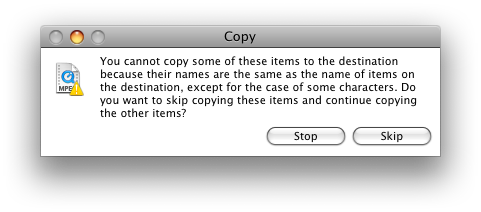Try copying two items whose names match in every way except case from a local drive to another local drive in the Mac OS X Finder and you'll see something like this:

This makes plenty of sense. The Finder (actually, the filesystem on which the Finder resides, in this case HFS+) is not case-sensitive by default, so it sees the file "intro.mpg" as being identical to "Intro.mpg" and therefore simply alerts the user of the presence of a like-named file and asks him how to proceed.
But the other day I got the strangest alert I've seen in a while when trying to copy a file named "Intro.mpg" from my networked home account to a local folder with a file called "intro.mpg":

Seems that, all of a sudden, we have some case issues. Now why would that be?
It appears that if the originating file comes from my network home, and if that network home lives on an NFS mount, and if the filesystem that hosts that network home is case-sensitive — all of which in this case is true — the Finder kinda freaks out. Or at least alerts the user in a very strange way. I mean, what's with that wording? I don't think I've ever read a more convoluted sentence in my life. And the options spelled out in that sentence — "skip" or "continue" — are not reflected in the language used by the buttons — "Stop" or "Skip." Tsk, tsk! And "some of these items?" Dude, it was only one item. I swear.
Actually, this last one I think I understand: Though I was only copying one Finder item, as users of non-HFS filesystems might be aware, copying between HFS and non-HFS filesystems will cause the creation of dot-underscore files, which are there to preserve HFS-specific data about the file in question. These files automatically get created and follow the file around invisibly, transparently to the user. I believe the Finder was taking these additional files into consideration in the alert. This may or may not be true. I can really only guess. But that's my hunch.
Nevertheless, this alert is abominable, if somewhat amusing. Apple still has some work to do when it comes to the wording in their alerts.
And they clearly have some work to do when it comes to dealing with conflicts on non-HFS volumes as well.
UPDATE: I've changed this post slightly for clarity.
